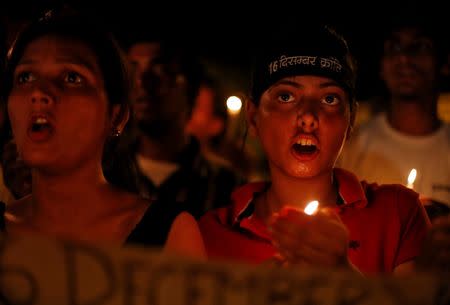Juveniles who rape should be treated as adults, says minister

By Nita Bhalla NEW DELHI (Thomson Reuters Foundation) - India is planning to amend a law to allow some juveniles found guilty of crimes such as rape and murder to be given the same punishments as adults, the country's new women and child welfare minister has said. Maneka Gandhi, who took office after her Bharatiya Janata Party swept to power in May elections, said she planned to change the current law which defines a person below 18 years as a juvenile and fixes maximum punishment - no matter what the crime - at three years in a correctional home. "We are changing the law. In fact, I am working on it personally and I will see that it is changed to bring 16-year-olds into the purview (of the law)," Gandhi told a news conference in Chennai on Sunday. "According to the police, 50 percent of all sexual crimes are committed by 16-year-olds who know the Juvenile Justice Act, so they can do it. But now for premeditated murder, for rape, if we bring them into the purview of the adult world, then it will scare them." According to the National Crime Records Bureau, the number of rapes in India rose by 35.2 percent to 33,707 in 2013 compared to the previous year - with Delhi reporting 1,441 rapes. The Juvenile Justice Act has come under scrutiny since the fatal gang rape of a 23-year-old woman on a Delhi bus in December 2012 by six assailants, one of whom was 17 years old. While one of the perpetrators committed suicide in jail and four others were sentenced to death, the teenager was given three years in a juvenile home, sparking debate over whether India is too soft on young offenders. From public protests to debates on television and on Twitter, many Indians felt a sense of injustice over the case, which shone a global spotlight on violence against women in India. The victim's family on Monday welcomed Gandhi's decision to treat 16-year-olds as adults. "I support the minister's decision. These 16-year-olds who are committing these crimes think they can get away with anything. At least this will instil fear in them and they will think twice before they act," the young woman’s mother told CNN-IBN television. However, human rights groups have warned against changes to the law, saying that each case must be considered individually. They say many young criminals are from poor households, are poorly educated, have often been abused themselves and need to be given the chance to reform. "Children under 18 should remain under the juvenile laws and any punishment should be to ensure reform and eventual reintegration into society as a law abiding person," said Meenakshi Ganguly, South Asia director for Human Rights Watch.

